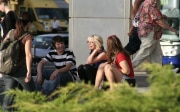
The scholarship Programme financed by the Swiss Enlargement Contribution, namely the Scientific Exchange Programme between the New Member States and Switzerland, abbreviated as “Sciex-NMS.ch”, enables doctoral and post-doctoral students from the new EU-Member States to come to Switzerland to conduct their research. The Programme is providing support to some 460 academicians. With a total endowment of CHF 45 million, the Programme is open to young research scientists from Bulgaria, Estonia, Latvia, Lithuania, Poland, Romania, Slovenia, Slovakia, the Czech Republic, and Hungary. The stay in Switzerland is meant to strengthen the individual scientific capacities of the young researchers, to foster academic exchange, and to jointly develop future-oriented approaches to research. Switzerland contributes its expert know-how in the domain of education and research, while simultaneously strengthening its contacts to academic networks in the new EU-Member States.


